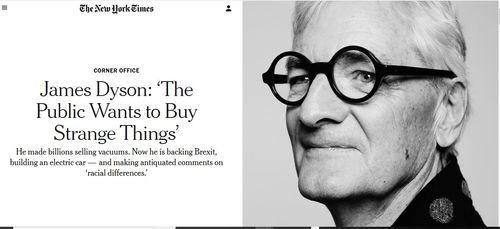


By Steve Sailer
12/08/2018
From The New York Times:
James Dyson: ‘The Public Wants to Buy Strange Things’
He made billions selling vacuums. Now he is backing Brexit, building an electric car — and making antiquated comments on ‘racial differences.’
By David Gelles, Dec. 5, 2018
James Dyson is unapologetically British.
… Yet in a globalized economy, Mr. Dyson remains intently focused on what he believes is Britain’s exceptional place in the world. He wistfully refers to the British Empire, and unlike most in the business community, is in favor of Britain’s withdrawal from the European Union, believing Brexit will make the country stronger economically and culturally.
In this interview, Mr. Dyson expressed antiquated and at times offensive views on “racial differences” and Japanese culture. He also referred to growth markets in Asia as the “Far East.”
You are not supposed to say “Far East” anymore? I see that the NYT has printed 3 other articles this month containing the suddenly inappropriate “Far East.”
What about “Middle East?” The New York Times has published 14 articles today alone containing the presumably problematic term “Middle East.”
Isn’t it racistly Otherizing to suggest that anyplace is “east,” when you could also get there by going west (or north or south, for that matter)?
When asked to clarify his remarks, Mr. Dyson declined to comment further. (Read a portion of his comments on Japan below.)
Q. When we met earlier in the year, you told me something about Japan.
A. We do a lot of our product launches in Tokyo. They’re technology nuts. They love artifacts. In this P.C. world, we like to not say anything interesting about people that are different from us. But the Japanese were, when I went there, very, very different. They told me I have a nose like the Eiffel Tower. The girls want to spend their whole teenage years to get their noses more like Western noses. I think racial differences are fun. And they’re sometimes funny and they’re a source of amusement between us. But of course, that’s not a very P.C. thing to say.
Whenever we went there, we thought you had to learn to behave like a Japanese person, you know, bowing. What I quickly learned is that’s not what they wanted from us at all. They wanted our eccentricity and difference. So, I carried on being an Englishman.